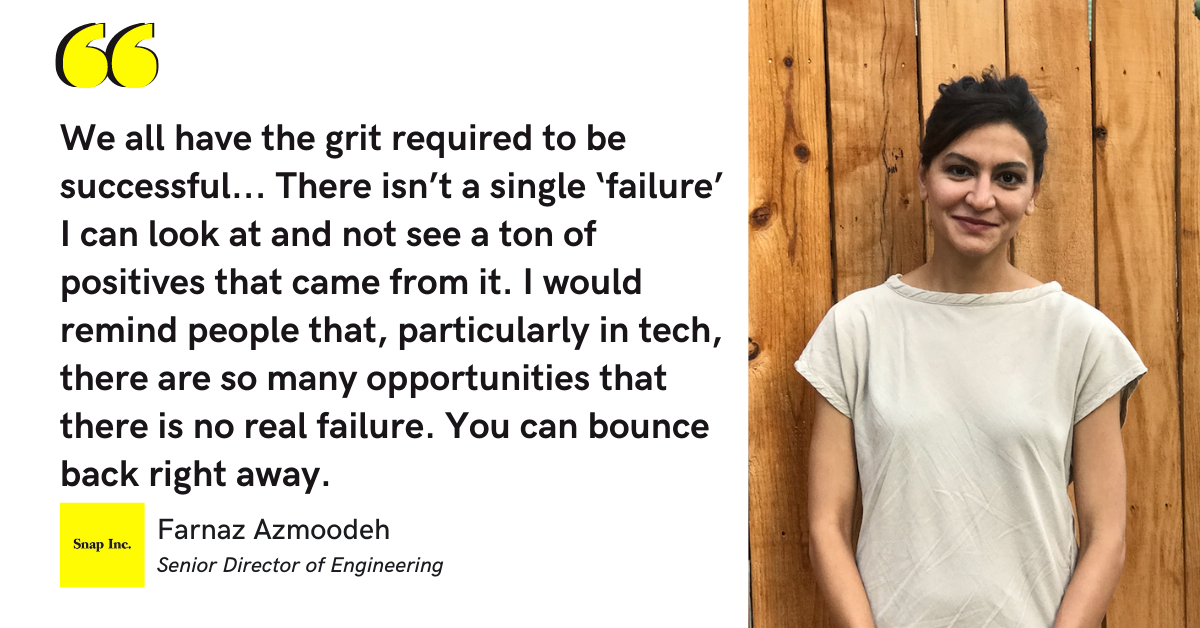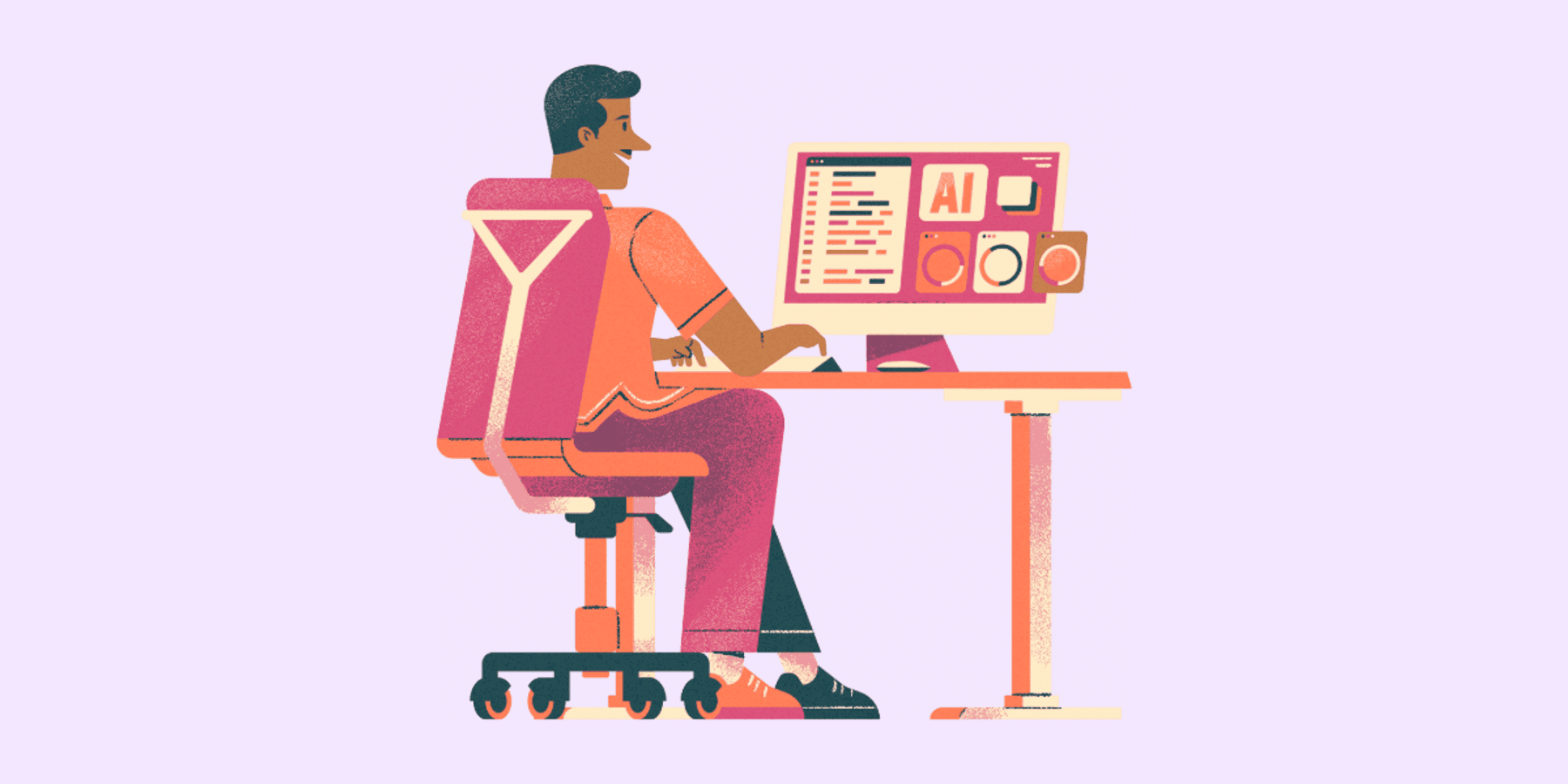Farnaz Azmoodeh used to dislike running. She was really, truly, actively not interested.
But after suffering through it for a few months, it's now one of her favorite things to do. "I get so much joy out of it," says Farnaz. The same thing happened when she started making pottery: she says the first month was "terrible" as she struggled to shape the clay with no success but shares that she came to love the process of building after getting through an initial period of learning and adjusting.
Farnaz draws a parallel from her approach to hobbies to her approach to her career. She's currently a Senior Director of Engineering at Snap, a role she's earned after taking several calculated risks at work, each of which came with its own uncomfortable period of growth and adjustment. She's learned to chase those periods and value them for the growth that they bring.
We sat down with Farnaz to hear about her path to Snap, how she first identified the benefits of taking risks at work, and what advice she has for other women looking to make bold moves to advance their careers.
Learning to go for it
Farnaz was working on her PhD in computer science at USC when she got an email from Google. They were recruiting for engineers. She'd just completed the required courses for a master's and wasn't planning on leaving her PhD program, but the opportunity made her reconsider her plan. She realized that she wasn't feeling fulfilled by having to go so deep (versus broad) in her studies and wondered if making the switch from academia to industry would allow her to get more meaning from her work. "I was really frustrated," explains Farnaz. "I'd be doing this amazing work, and the output was often a paper, as opposed to putting what I'd built in the hands of people to use."
So she took the first of many risks in her career and left her PhD to join Google's publisher quality team. In her first few months on the job, she realized that instead of just focusing on making sure that the content Google's advertisers were showing up on was brand safe and removing bad content, they could also try to proactively find quality content. Farnaz set out to work on that and soon found herself preparing to present her team's findings to Google's founders.
"It was really exciting for me, presenting my project to these legends," she remembers. "I was nervous. Either they were going to promote me and this was going to jumpstart my career, or I was going to get fired, and I wasn't sure which one."
As you may have guessed, it ended up working out just fine, and Farnaz went on to spend almost 10 years at Google. Halfway through her tenure there, she ended up taking another big career leap: this time, stepping up to be a manager.
"In our field, you either need to go down the direction of being a technical lead or becoming a manager in order to multiply your impact," explains Farnaz. She chose the latter, but didn't find it to be the smoothest transition.
"It was extremely difficult for me," she says. "I went from being able to pinpoint what I was responsible for, going home and knowing exactly what I accomplished that day, to this role where I couldn't get a tangible sense of the impact I was having." (Eventually, she learned to quantify her impact as a leader with the help of mentors who had made the same transition, but the learning curve was certainly steep!)
When the opportunity to work at Snap came up, Farnaz recognized it as a risk from the beginning—but she also saw that the company was built on embracing that risk. "Imagine the DNA of the company where the idea is 'hey, I'm going to go build an app with disappearing photos and videos.' It's such a different way of looking at it. The culture at Snap empowers people to take risks and be creative about solving old problems from a different perspective," says Farnaz. "Snap acknowledges the importance of being a risk taker, being creative."
Every two years: a framework for signing up for constant growth
When Farnaz became Senior Director of Engineering at Snap and had to learn how to run the platform engineering team, she was certainly forced out of her comfort zone—she didn't have a background in platform engineering and remembers having to "study almost every night" to pick up the skills she needed to be successful.
But just like with running or pottery, Farnaz got the hang of things pretty quickly. Looking back now, she's realized that her career has tended to follow a pattern.
Farnaz explains it as a two-year cycle. First, she takes on a new role outside of her comfort zone and feels overwhelmed. Then, she builds up the skills and experience to do that role well. After some time operating from a place of relative expertise and comfort, she needs to take on something new to make sure she's still growing.
"I've learned that this cycle repeats almost every two years. That's how long it takes me to get comfortable, and if I don't make a change at that point, I'm going to get really bored, and that's not a good state for me," she says.
She doesn't think about it as a hard and fast ticking clock, but she does make sure to stay open to new opportunities. "Keeping myself and my options open helps me absorb opportunities a lot better than having a fixed mindset around 'this is what I want to do in two years,'" she explains.
3 ways to be bold in your own career
Farnaz acknowledges that the right ratio of challenge to comfort will be unique to each individual, but she does want to encourage others to stretch themselves and take risks when it's right for them. She left us with a few tips for getting started:
1. Do your homework. "Taking educated risks requires you to do some real homework and be conscientious about what it is that you're doing, how you're going to avoid mistakes, and ensure that you're not jumping hastily into commitments," says Farnaz.
2. Invest in your confidence. Farnaz's two-year approach allows her enough time to get comfortable in her past role before taking a new one, and she highlights the importance of spending some time in that comfort zone before moving on. "Learning and absorbing is really fun, but at the same time, it's very humbling. After every major change, you often find that you're the person in the room who doesn't have much to add. But then you ramp up slowly and you get to the point where you're actively contributing, and I've learned I need to stay in that zone for a little bit to build my confidence back up and be able to remind myself when I'm facing the next challenge that I've been through it before."
3. Don't be afraid of failure. Being scared to fail or to be judged is an understandable feeling before taking on something new, says Farnaz, but a misplaced one. "We all have the grit required to be successful, even though it might take time," she says. "There isn't even a single 'failure' I can look back at and not see a ton of positives that came from it. I would remind people that, particularly in tech, there are so many opportunities that there is no real failure. You can bounce back right away."
If you're interested in joining Farnaz at Snap, check out their open roles here.




